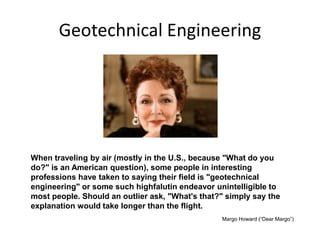The Ultimate Guide To Geotheta
The Ultimate Guide To Geotheta
Blog Article
The Single Strategy To Use For Geotheta
Table of ContentsGeotheta Things To Know Before You Get This8 Easy Facts About Geotheta ShownNot known Facts About Geotheta6 Simple Techniques For GeothetaThe 7-Second Trick For Geotheta

They conduct site examinations, collect samples, do research laboratory tests, and analyze data to review the suitability of the ground for building and construction projects - Geo Tech Engineer. Based upon their searchings for, geotechnical designers provide suggestions for foundation style, slope stability, preserving frameworks, and mitigation of geotechnical dangers. They collaborate with other specialists, such as engineers, structural designers, and building groups, to guarantee that geotechnical factors to consider are incorporated into the overall project style and implementation
By assessing the behavior and residential or commercial properties of soil and rock, they can recognize prospective geotechnical threats such as landslides, soil settlement, or incline instability. Their proficiency helps protect against failings or accidents that can jeopardize lives and home. Below are some comprehensive responsibilities and duties of a geotechnical engineer: Website Examination: Geotechnical engineers conduct site investigations to gather information on subsurface problems.
They interpret the information to understand the residential or commercial properties and actions of the soil and rock, including their strength, leaks in the structure, compaction features, and groundwater problems. Geotechnical Evaluation and Style: Geotechnical designers assess the data gathered during website examinations to assess the security and viability of the website for building tasks. They execute geotechnical calculations and modeling to assess aspects such as birthing capability, settlement, incline security, side earth stress, and groundwater flow.
Rumored Buzz on Geotheta
Foundation Style: Geotechnical engineers play an important duty in making structures that can securely sustain the intended framework. They examine the soil problems and load requirements to establish the suitable foundation kind, such as shallow foundations (e.g., footings), deep structures (e.g (https://hub.docker.com/u/geotheta)., heaps), or specialized strategies like dirt enhancement. They consider elements such as settlement restrictions, birthing capacity, and soil-structure communication to create ideal structure layouts
They examine building and construction plans, display site activities, and perform field evaluations to verify that the design suggestions are followed. If unanticipated geotechnical issues arise, they evaluate the circumstance and provide suggestions for removal or adjustments to the layout. Danger Assessment and Reduction: Geotechnical engineers analyze geotechnical dangers and risks related to the job site, such as landslides, liquefaction, or dirt erosion.

Cooperation and Communication: Geotechnical designers work closely with other specialists associated with a task, such as designers, structural designers, and construction groups. Reliable communication and partnership are important to integrate geotechnical considerations right into the general job design and building procedure. Geotechnical engineers give technical competence, response queries, and ensure that geotechnical needs are met.
6 Simple Techniques For Geotheta
Here are some sorts of geotechnical engineers: Foundation Engineer: Structure designers specialize in developing and assessing structures for frameworks. They evaluate the soil problems, lots requirements, and site attributes to establish the most suitable structure kind and style, such as shallow foundations, deep structures, or specialized strategies like pile structures.
They evaluate the factors influencing incline security, such as dirt homes, groundwater conditions, and slope geometry, and create strategies to prevent incline failures and reduce dangers. Quake Designer: Quake engineers specialize in examining and creating frameworks to stand up to seismic pressures. They assess the seismic hazard of a site, evaluate soil liquefaction potential, and develop seismic design requirements to guarantee the safety and strength of frameworks throughout earthquakes.
They perform area testing, accumulate examples, and evaluate the accumulated information to identify the dirt residential or commercial properties, geologic formations, and groundwater problems at a website. Geotechnical Instrumentation Designer: Geo Tech Engineering Geotechnical instrumentation engineers concentrate on surveillance and measuring the habits of dirt, rock, and structures. They mount and preserve instrumentation systems that keep an eye on factors such as soil settlement, groundwater levels, incline motions, and architectural variations to analyze performance and provide very early warnings of possible concerns.
The Ultimate Guide To Geotheta
They perform tests such as triaxial tests, combination tests, straight shear examinations, and permeability tests to collect information for geotechnical evaluation and style. Geosynthetics Designer: Geosynthetics engineers specialize in the design and application of geosynthetic products, such as geotextiles, geogrids, and geomembranes. They make use of these materials to improve soil security, reinforce inclines, give water drainage solutions, and control erosion.
They have a tendency to be investigative individuals, which means they're intellectual, introspective, and curious. They are interested, methodical, logical, analytical, and rational. Some of them are additionally social, suggesting they're kind, generous, cooperative, person, caring, handy, understanding, sensible, and pleasant. Does this audio like you? Take our free career examination to find out if geotechnical designer is among your top job suits.
In the workplace atmosphere, geotechnical engineers utilize specialized software application devices to perform calculations, create designs, and examine information. They prepare reports, review task requirements, connect with clients and staff member, and coordinate task tasks. The office setting supplies a helpful environment for research, analysis, and cooperation with other specialists entailed in the job.
Geotheta for Dummies
They frequently go to task websites to conduct website examinations, evaluate geotechnical problems, and gather data for evaluation. These gos to entail traveling to various places, often in remote or tough terrains. Geotechnical designers might carry out dirt tasting, conduct examinations, and display building activities to make sure that the geotechnical aspects of the project are being executed properly.
Geotechnical engineers additionally work in specialized geotechnical labs. In these facilities, they perform experiments, execute tests on dirt and rock samples, and analyze the design buildings of the materials. Geotechnical lab engineers function thoroughly in these settings, taking care of screening devices, running tools, and taping information. They team up with other research laboratory staff to ensure exact and trusted screening outcomes.
Report this page